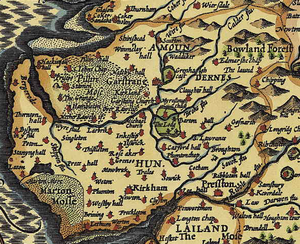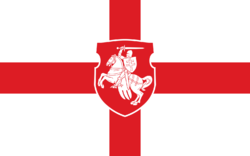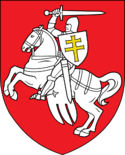Kingdom of Amounderness
This article may require cleanup to meet MicroWiki's quality standards. |
Kingdom of Amounderness Royaume d'Amounderness Regnum Amounderness | |
|---|---|
| 'Motto: 'National Motto: Deo et patriae (Latin: For God and country) Royal Motto: In hoc signo vinces (Latin: In this sign thou shalt conquer) | |
| Anthem: National Anthem: Rose of England Royal Anthem: God Save The King | |
 A map of Lancashire's divisions into local Boroughs, with Amounderness in red adopting the boundaries at the centre. | |
| Capital | Blackpool (de facto) Preston (de jure) |
| Largest city | Preston (Including the Metro Area) |
| Official languages | English (State Capacity) French and Latin (Recognised) |
| Demonym(s) | Amoundernessian 'Mounder (Informal) |
| Government | Unitary Constitutional Monarchy |
• King | Marcus I |
• Prime Minister | Unfilled |
• Heir Apparent/Crown Prince | Unfilled |
| Legislature | Royal Council |
| Establishment | June 18th, 2019 |
| Population | |
• (2017 population estimates) census | 470, 320 (16 registered Citizens) |
| Currency | Pound Sterling |
| Time zone | Preston Standard Time (PST / GMT) |
This nation is not currently a member of any organisations | |
The Kingdom of Amounderness, more commonly known as Amounderness, is a self-declared sovereign state in the form of a unitary constitutional monarchy. The Kingdom is located in the region of Lancashire, a county in the North West of England from which it's historical name, culture and language are taken.
The Kingdom of Amounderness functions as a Constitutional Monarchy, with a written constitution detailing the powers of the King, Ministers and the Royal Council. However, critics would state the Kingdom is more of an absolute monarchy, with significant powers held by the Founding King, Marcus I.
The Kingdom was founded in an effort to maintain local cultural traditions, and as part of a wider English Nationalist movement, attempting to help revive traditional values and promote a society based on faith, hierarchy and honour. The Kingdom seeks to cooperate with other English realms and Monarchs, working to promote and conserve English culture, faith and folklore. Christianity plays a key role in the politics and society of the nation.
Amounderness' current King, Marcus I, aims to build an organisation to promote the unity of English micro-states, eventually holding joint processions, festivals, projects and conventions.
Etymology
The name is said to have been first recorded in 705 as Hacmunderness, whilst the Domesday Book in 1086 spells it Agemundrenessa. There are currently two theories surrounding the etymology for Amounderness. The traditional theory was that the name derived from ac (oak) and mund (protection), "a ness or promontory sheltered by oaks". The current and most commonly adopted view is that the area has been named after Agmundr, a Norse warlord and vassal of the Kings of Jorvik in the early 900sAD.
History
((INSERT A SHORT HISTORY OF YOUR MICRONATION [i.e. a few important events]))
Inspiration and Foundations
Declaration and Implementation
Politics and government
The Kingdom of Amounderness is a Christian Kingdom, founded upon the ideals of 'faith, hierarchy and honour.' And so it is unsurprising that these ideals can be seen throughout the political system of the realm. The King acts as the Head of State, the highest executive in the land. The King, according to the constitution, is sworn in during a special session of the Royal Council and is required to state the following:
"I, Insert name, swear by Almighty God to respect the Constitution and the law, protect the independence of the Realm, safeguard its territorial integrity, and defend the freedom and interests of its people."
This act, along with the full ceremony of coronation, completes the act of confirming the new Monarch. Similar oaths are taken by the Heir Apparent (Crown Prince), Ministers, Royal Council members and other public servants.
Royal Council
The Royal Council is a semi-elected body, although currently not active, it is the main legislative body of the realm. A portion of its members are directly elected via general, secret ballot, whilst the remaining members are appointed by the King. These include members of the nobility and church officials.
Council of Ministers
The King appoints the Prime Minister, who heads the government and chairs the Council of Ministers. Ministers are chosen by the Prime Minister, generally selected from the Royal Council, with the Kings approval and sworn in. Together with the King, Ministers draft laws which are passed to the Royal Council for scrutiny and approval, the laws are then passed back to the King for royal approval and implementation into law. No law comes into force without the Kings approval. Whilst the Royal Council is inactive, the Council of Ministers and the King act as the legislative body of the land.
Departments and Ministries
State Church
Recently Marcus I has set about establishing a Church of Amounderness, along with a Code of Morality and Chivalry to be taught in the Kingdom's education facilities, churches and monasteries.
Monarch
Law and order
There are plans for the establishment of a Supreme Court of the land, whilst the constitution provides for a Supreme Council to supervise the delegation of law and ensure courts act efficiently and constitutionally. There are also laws planned to ensure proper procedure for the appointment of judges, and the ability of convicted nationals to appeal to the King, who may grant clemency if he so chooses.
The Police Forces are under the control of the Armed Forces, in the form of a Gendarmerie, performing general policing duties, protecting public monuments, institutions and events.
Foreign relations
Amounderness foreign policy has two main aims. The promotion of Christianity, along with cooperation with Christian nations both within and outside England. And the rejection and exclusion of Marxist-Socialist, overly progressive and ideologically destructive nations from micronational politics and society. The current King seeks to enshrine traditional values and build organisations and structures to rejuvenate former national and regional identities and instil pride and faith once more.
Military
The King holds the title of Commander-in-Chief of the armed forces of Amounderness, who supervises the armed forces with the assistance of the Defence Council. The Defence Council is made up of all the heads of the branches of the armed forces. The Intelligence Services are also under the remit of the Armed Forces.
Geography

The Kingdom is split into two main geographical regions, The Fylde (Amounderness Exterior) which is a coastal plain in the West of the realm and Amounderness Interior which is a largely rural area. The M6 Motorway passes through the Kingdom from Preston, on the River Darwen towards Lancaster, on the River Lune, dividing the two regions.
The Fylde
The River Wyre meanders across the Fylde from Garstang on the Eastern edge, westwards towards Poulton and then northwards to the sea at Fleetwood. The area north and east of the tidal Wyre, known as Over Wyre, is the more rural side of the river. The Fylde itself is roughly trisected by the M55 motorway and A586 road.
The west coast of the Fylde is almost entirely urbanised, with many towns such as Fleetwood, Cleveleys, Blackpool, St Annes and Lytham dotting the seaside. Whilst following the southern coastline or crossing the river Wyre, the area becomes incredibly rural, with only small towns and villages such as Kirkham, Wesham and Freckleton.
Amounderness Interior
Amounderness Interior
Location

The Realm is located in the North West of England, covering a portion of the English county of Lancashire, specifically the Fylde Coast and the inner regions of Lancashire which used to compose the historic 'Hundred' of Amounderness until the recent foundation of the Kingdom.
Administration
The Kingdom is composed of four Administrative Boroughs of differing size and population. Within these Boroughs, there are also local parishes unless other institutions are in place. These systems are a continuation of the administration that took place prior to the Kingdom's existence, although the functions and powers of these local administrations may be altered in future. These four boroughs make up what is called the "Home Boroughs", whilst any lands which are acquired outside the region will likely enter arrangements separate to these.
Weather & Climate
Wildlife
Economy
As of June 2019, the Kingdom does not maintain its own currency. Instead, citizens are permitted to use Pound Sterling for transactions and day to day use. It is planned however that a national bank will be created, and local currencies may be produced and trialled in future. At the moment there are currently no companies, banks or trading firms registered with the government.
It is a priority of the current government and Monarch to attract investment and encourage citizens to 'think creatively' and produce a local economy based around the regions 'rich culture, traditions and numerous festivals'. Despite the Kingdom's promotion of faith, this does not contradict the need for development and scientific discovery. Largely due to the King's personal interest in the subjects, citizens and outsiders alike are encouraged to find new discoveries in the fields of chemistry, physics, astronomy, computing and robotics. The Kingdom hopes to encourage the development of a fourth 'Industrial Revolution' involving robotics, automation and computing in England, as the historical home of industrial development, as well as the birthplace of the first Industrial Revolution.
There is also hope that the establishment of the Kingdom may produce it's own tourist economy in the future, benefiting the local economy and spurring development.
Culture
((INSERT INFORMATION ABOUT THE CUSTOMS, EDUCATION, LANGUAGE(S), THE ARTS, THE PRESS, TELEVISION, ETC.))
Cuisine
Religion
Media
Sports
Holidays
Trivia
See also
((INSERT A FEW PAGES RELATED TO THIS PAGE HERE))
External links
((FAIRLY SELF-EXPLANATORY))
((MAKE SURE TO ADD CATEGORIES TO YOUR PAGE HERE, SUCH AS [[Category:Micronations]] AND [[Category:{name of micronation}]]))





